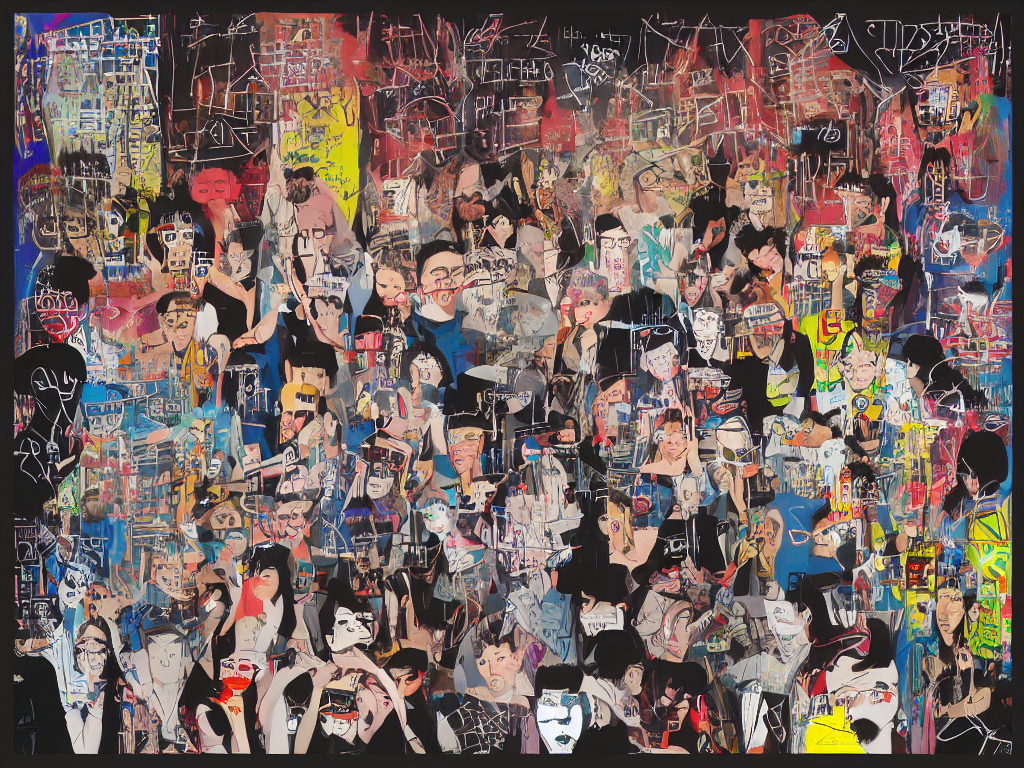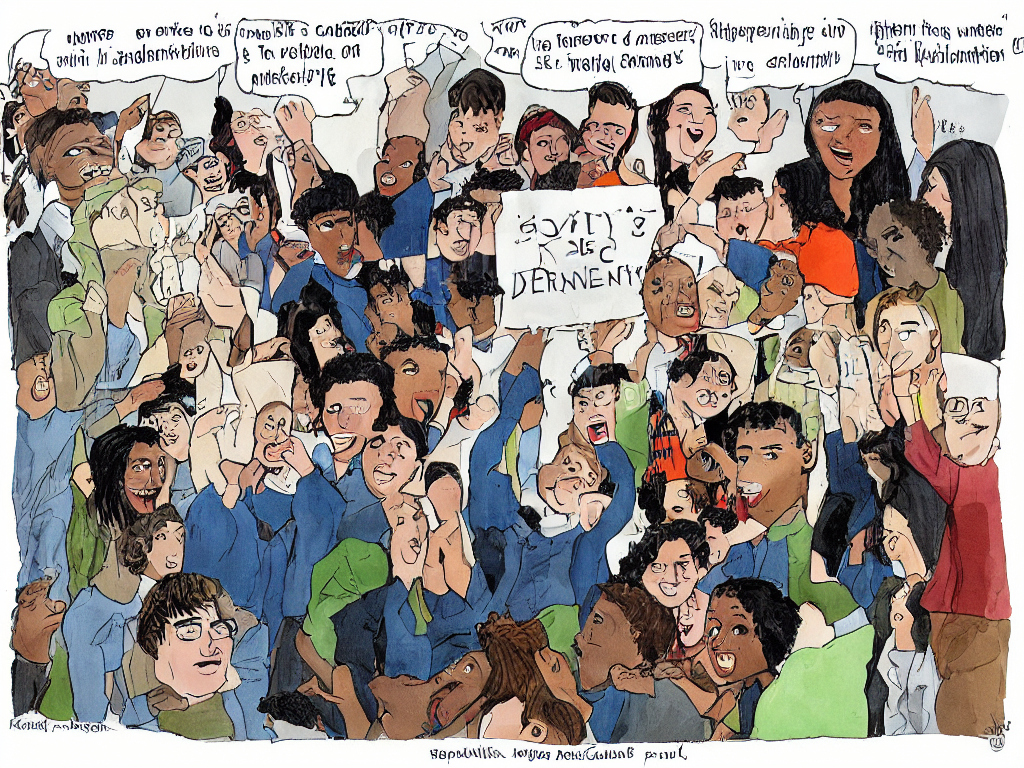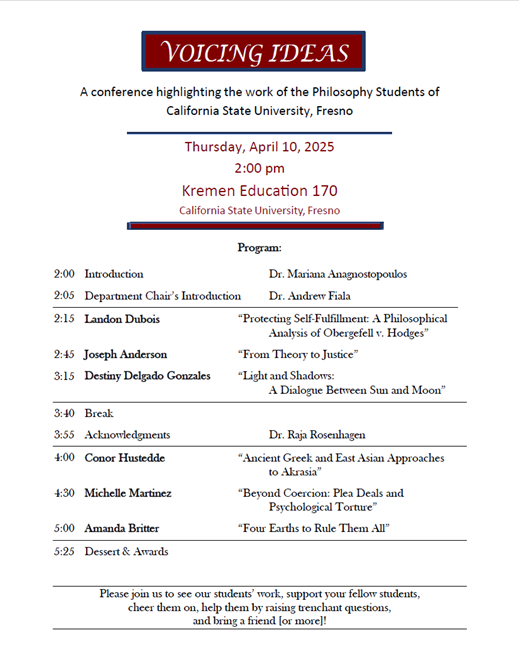Department of Philosophy
- Arts and Humanities
- Department of Philosophy
- Student Information
- Voicing Ideas
Voicing Ideas
"Voicing Ideas" is an annual conference highlighting the work of philosophy students at California State University, Fresno. It typically happens in the Spring [March or April], and is open to all students who are taking philosophy classes.
![student conference AI generated [black and white]](/philosophy/images/0-pics-other/student-conference2.jpg)


[Student conference, pictures created using deepai.org]
Details regarding submissions will be announced here.
Voicing Ideas 2025
Date: April 10, 2025, 2 pm - 6 pm, Kremen Education 170
2:00 Introduction Dr. Mariana Anagnostopoulos
2:05 Department Chair’s Introduction Dr. Andrew Fiala
2:15 Landon Dubois “Protecting Self-Fulfillment: A Philosophical Analysis of Obergefell v. Hodges”
2:45 Joseph Anderson “From Theory to Justice”
3:15 Destiny Delgado Gonzales “Light and Shadows: A Dialogue Between Sun and Moon”
3:40 Break
3:55 Acknowledgments Dr. Raja Rosenhagen
4:00 Conor Hustedde “Ancient Greek and East Asian Approaches to Akrasia”
4:30 Michelle Martinez “Beyond Coercion: Plea Deals and Psychological Torture”
5:00 Amanda Britter “Four Earths to Rule Them All”
5:25 Dessert & Awards

Voicing Ideas Archive
2024 Presenters
Katie Dyer, "Genesis 19:30-38"
Jordan Hernandez, "Lying on the Internet and a Kantian Basis for Truthfulness"
Hunter Cross, "A Metaphysical Investigation of Equal Human Rights"
Michelle Martinez, "Do We Have a Moral Duty to Prevent the Captivity of Intelligent and Social Animals?"
2023 Presenters
C. S. Bevens, "Social Injustice of Sex-Segregation in a University Setting and teh Impact on Transgender Students"
Kimberly Madrigal, "The Modern Muslim Woman's Double Bind: The Conflict Between Qur'anic Discourse, Historical Precedent, and Mainstream Western Feminism"
Crystal Uyeno, "The Challenges of Student Parents Pursuing a Postsecondary Degree"
Alyssa Smith, "United Students Against Sweatshops: Organizing as a Solution to the Social Injustices of Labor"
Taylor Carrillo, "Execution Volunteerism: The Sigh of Relief on Death Row"
2022 Presenters
Macy Lemos, "COVID-19 and the Harm Principle"
Brittany Avila, "Why Chimpanzees Deserve Legal Rights"
Elise Higgs, "The Role of Tolerance in Perpetuating Structural Violence"
Clark Froelich, "Detrimental Societal Forces on Discipleship in The Gospel of Mark"
2021 Presenters
Session 1: Ethics between Theory and Practice
Teya Juarez, "Tolerance and Hospitality: Is Tolerance Enough?"
Alex Walker, "Malcolm X: A Virtue Ethical Hero"
Session 2: Negotiating Justice in the Legal System
Gurleen Kaur Mander, "The Crooked Bail System of America"
Taj Harris, "Our Criminal Justice System: Embracing the Truth through the Expelling of Convenience"
Session 3: The Challenge of Racism
Emily Nelson, "Structural Racism, Environmental Injustice, and Social Positions"
Caleb Charles, "The Racist Chocolate Industry"
Session 4: Comparison as a Tool of Academic Inquiry
Nicholas Linville, "The “Beginning” of Comparison"
Manuel Farias, "Comparing an Apache Rite of Passage into Womanhood and a Bat Mitzvah"
2020 Presenters
Ligaya Berdan, "Mill, Liberty, and the Law: How Legal Frameworks Confine Choice"
Abstract: Choice possesses a natural association with freedom, where more freedom is a product of more choice. In this article, I examine the nature of choice in the context of Mill’s work: On Liberty. What I discuss is that the romanization of freedom is problematic, and that societal constraints on choice cultivates true freedom. In this sense, such constraints on freedom will both magnify individual utility and encourage actions that benefit the society.David Dunn, "Parmenides's Apophatic Argument"
Abstract: This paper outlines Parmenides’s argument on the nature of what-is. In On Nature, Parmenides argues that everything that is is “ungenerated and imperishable, whole, unique, steadfast, and complete.” Parmenides’s description of each of these qualities is apophatic: that is, it follows indirectly from his description of what what-is is not, or the qualities it lacks. This paper follows the steps of this argument, which is subtle and often only implicit in Parmenides’s writings. Read David's paper.Clark Froelich, "Hierarchy and Celibacy within Pauline Traditions"
Abstract: The Pauline letters of the New Testament are divided into three categories: first, second, and third Paul. First Paul consists of letters near universally considered by biblical scholars to be authentically written by St. Paul. Second and third Paul are letters where there is less agreement over their authenticity- third Paul being the least affirmed of all three categories. Assuming pseudonymity, second and third Paul borrow from first Paul's authority to bolster their own claims. A third post-Paul tradition, The Acts of Thecla, similarly draws from first Paul's authority. "Hierarchy and Celibacy within Pauline Traditions" argues that second and third Paul to different degrees deviate from first Paul’s teachings on celibacy while also reinforcing his use of hierarchy, whereas Thecla maintains first Paul’s teachings on celibacy and does not reinforce his use of hierarchy.Ryan Johnston, "Without a Cartesian Doubt"
Abstract: In an effort to discover beliefs that could be known with absolute certainty, René Descartes attempts to deny every single belief he has–from simple math to his own body. The question my paper deals with is whether or not Descartes can actively choose to doubt or believe something. Another way of saying it is, do we choose our beliefs or are they things that we find we have? I argue that only under specific circumstances can one truly choose to doubt/believe something, and Descartes' situation fulfills that criteria.August Reinhold, "Hume and Kant on Miracles"
Abstract: In this paper, I will examine and compare Hume’s and Kant’s view on miracles. Having examined Hume’s account of miracles in An Enquiry Concerning Human Understanding as well as Kant’s view in the Religion within the Limits of Reason Alone, I argue that while the two philosophers’ perspectives and definitions of miracles differ, they reach the same conclusion: an event is only ever perceived to be ‘miraculous’ because of our own misunderstandings of the laws of nature. Read August's paper.Daisy Underhill, "Barriers to Equal Access of Opportunity: Zip Codes and Education"
Abstract: One of the fundamental presumptions of public education is that it will equip all U.S citizens with the same tools to be effective citizens through uniform schooling. However, the allocation of students and educational funding based on zip code creates disparities in educational outcomes and access to opportunity later in life. Given this and the correlation between zip codes and class status, this practice is an effective way of restricting equal access for minorities. This paper argues that this practice should be overturned and replaced with one that allows equal funding and access to equitable education for all citizens regardless of zip codes; this would ensure that all citizens have the same access to opportunity later in life.Samuel Wittstruck, "Aragorn Won the Race, Even Though Race is Just a Construct"
2019 Presenters
Daniel Alvarado, "YouTube and Marxism"
Chris Arnst, "Focusing on Akrasia"
Emilee Cantú, “Living out a Mindful and Philosophical Lifestyle”
Alexis Gomez, "Racist Sexism in the Legal System"
Madison Neal, "North Carolina and Moral Consent"
Abu Taha, "God as the Guardian of Enjoyment"
2018 Presenters
Michael Harter, "An Analysis of Alienation in 21st Century Office Labor"
Reshma Meister, "Art Needs Snobs"
Michael Nelson, "The Problems of Free Will and Quantum Weirdness"
Matthew Parson, "Embracing the Absurd: Curiosity Shall Prevail"
Anthony Piseno, "Christian Anarchism"
Jenna Van Fossen, "Schopenhauerian Pessimism in Light of 21st Century Emotion Research: The Value in Feeling Bad"
2017 Presenters
Katreena Duback, "The Ethical Classroom"
Amy Gage, “Religion and Ecology: What Pluralism Can Do for the Survival of the Environment”
David Majors, “The Pragmatic and Existential Value of the Buddha’s Path to End Suffering”
Arjun Mann, “Artificial Intelligence: Why it Deserves Human Rights”
2016 Presenters
Jacki Alvarez, “A Focus on Gender in Political Philosophy”
Katreena Duback, "No Less Than Body"
2015 Presenters
Arelis Clements, "A Relatively Stronger Ethical Theory"
Jacob Miller, "Reflections in London"
Juanita Perez, "Tall Trees, Indigenous Communities, and the Utilitarian Approach"
Guadalupe Remingo, "Dharma, Detachment, and Self-Realization in the Bhagavad-Gita"
2014 Presenters
German Marquez, "Addressing the Paradox of Akrasia"
Travis Webb, "Women, Drinking, and Rape"
Burke Rea, "Was Aquinas Really a B-Theorist of Time?"
Yashin Manraj, "Motion in the Pre-Socratics: Reestablishing the Nexus between Science and Philosophy"
2013 Presenters
Burke Rea, “Parmenides: A Modal Interpretation”
Lauren Williams, "The Pauline Corpus and the Competing Marriage Traditions Found Within”
Erica Barton, “Abort 'the Child': An Argument for the Denial of Reproductive Futurism"
Samuel Munson, “Samwise Gamgee: An Exploration”
2012 Presenters
James Alvin, “Ethics, Religion and Civil Discourse"
Samuel Munson, “Evolution of the Spectacle"
Sally Brown, "The Will to Understand"
Joshua Stein, "Crows Like Us"
2011 Presenters
Patrice De Guzman, “Moral Relativism Defined and Defended”
Nicolas Muñoz, “Harman’s Failed Defense of Moral Relativism”
Patricia Webber, “And Then it Was Now: An Investigation into the Metaphysics of A-Series Time”
Joshua Stein, “Grasping at Other Minds: Optimism and Obstacles in the Search for Consciousness Outside Ourselves”
Sarah Crawford, “Islamic Feminist Discourse and the Effects of the Eastern/Western Cultural Dialectic”
2010 Presenters
Sarah Crawford, “Neo-Darwinian Teleological Redundancy”
Joshua Stein, “The Two Gods of Monotheism”
Kevin Roche, “Corporate Morality in the Free Market”
Rafaela Ruiz, “Corporations and Individuals Share the Same Moral Responsibility to Not Cause Harm to Others”
Nicolas Muñoz, “Happiness Through Obligation”
Selena Farnesi, “Cultural Relativism is Necessary for Effective Utilitarianism”